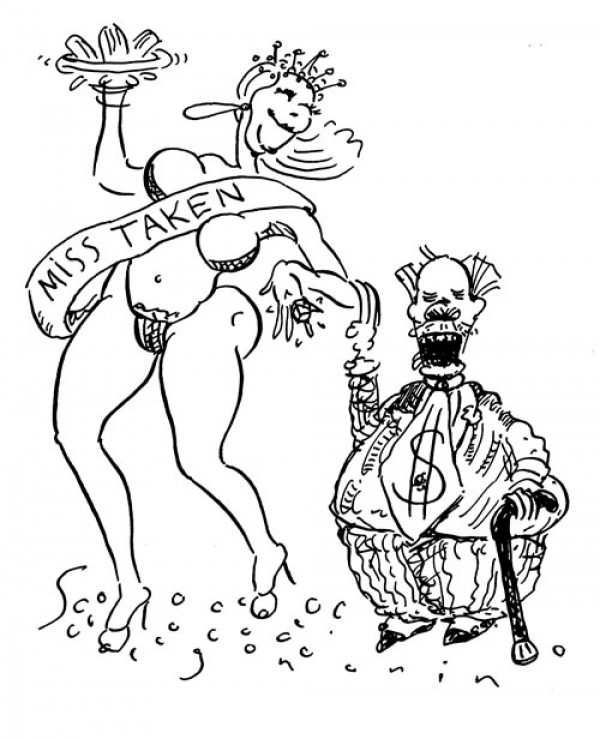
Does winning the Miss America title give the ladies a start on financial success? Or is it just something to list as an extracurricular, like a guy being an Eagle Scout? —Martha
The Miss America title—boy, there’s a much-devalued commodity. Once the pageant was one of the biggest events on television, with 85 million viewers in 1960. Today, ratings have fallen so low the contest briefly lost its big-time network slot and was consigned to basic cable.
Nonetheless, the fact that Miss America has been strutting her stuff since 1921 gives us a chance for a long-term look at whether being officially declared beautiful (and talented, let’s not forget that) pays off. As usual, I delegated the job to my assistant Una; as usual, she made a spreadsheet; and as so often we had acrimony and slammed doors.
The point of contention was the criteria for judging success. Una looked at how the lives of each of the 87 winners from 1921 to 2013 turned out and categorized them as Dismal, Humdrum, Successful and Star. Spreadsheet v1, it seemed to me, betrayed a retrograde notion of what constituted success.
“Una,” I said, “the major lifetime achievement of Norma Smallwood, Miss America 1926, was to marry two millionaires, and you’re categorizing her as a Star. Whereas 1996 winner Shawntel Smith became executive vice president of administration for IT firm PBH Holdings, and you’re calling that Humdrum. What kind of message does that send to young women?”
“Shawntel Smith is married to the rich guy who ran PBH Holdings, which went through numerous reorganizations and name changes and lost hundreds of millions of dollars before he was forced out of the company amid accusations of shady dealing,” Una said. “To me, the message is things haven’t changed much since the 1920s. She’s lucky I didn’t put her down as Dismal.”
“OK, not the best example,” I said. “Just the same, we need a more systematic method of evaluation. Can you give it another go?”
By and by, I received spreadsheet v2. This was an improvement. Miss America winners were now scored on a range of criteria, ranging from “married rich” (hey, we’re realists) to impact in politics, activism and showbiz, plus professional and educational attainment.
The scale of achievement also changed. No Miss America, in Una’s estimation, had led a truly Dismal life. Instead, the continuum of accomplishment started at Meh and ran up through Modest and Successful to Star.
The problem was the results didn’t pass the sanity test. The Miss America winners who had been most conspicuously successful didn’t crack the Stellar ranks. I know you specified financial success, Martha, but I thought we should cast a wider net, including fame and professional distinction in addition to fortune. After much angst, we came up with a measure of the first two commodities, namely, the length of each winner’s Wikipedia entry, on the possibly debatable two-part theory that, A., long entry = noteworthy life = success, and B., Wikipedia = vox populi = voice of God.
I’ll spare you the Byzantine methodology by which the above concept was applied and skip straight to the results ultimately produced:
• Meh, 5 percent (3 women)
• Modest, 23 percent (19)
• Successful, 63 percent (55)
• Star, 11 percent (10)
In sum, three-quarters of the Misses America went on to become Successful or better—no surprise, in my opinion. The women were attractive and ambitious and knew how to make an impression. If you can’t parlay that into a comfortable lifestyle, you’re doing something seriously wrong.
Perhaps more interesting is that 1 in 9 became Stars, typically in the Hollywood sense of the term. A sampling:
• Bess Myerson, who won the 1945 title, remained in the public eye for decades, first as a TV game-show regular and later as a New York City public official and politician. (Later still, things went off the rails: she took up with a crook who did time for tax fraud, was forced from office by scandal, and pleaded guilty to shoplifting in 1988.)
• Lee Meriwether, Miss America 1955, has enjoyed a showbiz career that so far has spanned more than 50 years, appearing as Catwoman in the 1966 movie version of Batman and earning several Golden Globe and Emmy nominations.
• Phyllis George, the 1971 winner, became a network sportscaster and, later, morning newsanchor for CBS.
• Vanessa Williams, Miss America 1984, resigned her title under pressure after nude photos of her were published in Penthouse but got past that to become an award-winning actress, model and singer, as detailed in a Wikipedia entry running to more than 5,000 words.
• Gretchen Carlson, the 1989 winner, has hosted Fox & Friends for years and will get her own show on Fox this fall.
Not bad considering we’re talking about a beauty contest. Miss America isn’t the only title that presents opportunities, though. Just ask Oprah Winfrey, who broke into broadcasting after being crowned Nashville’s Miss Fire Prevention of 1971.
Send questions to Cecil via StraightDope.com or write him c/o Chicago Reader, 350 N. Orleans, Chicago 60654.